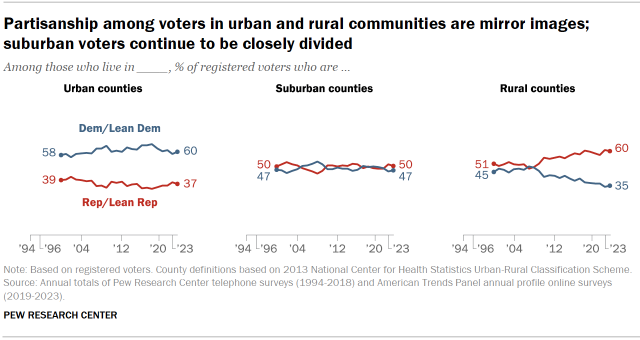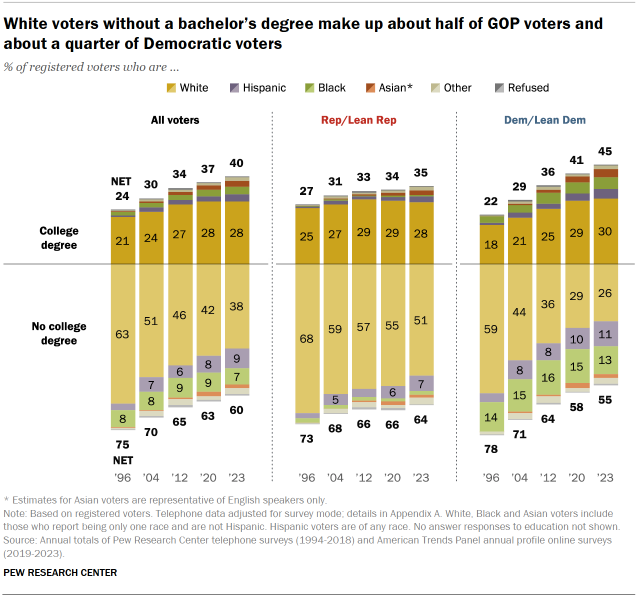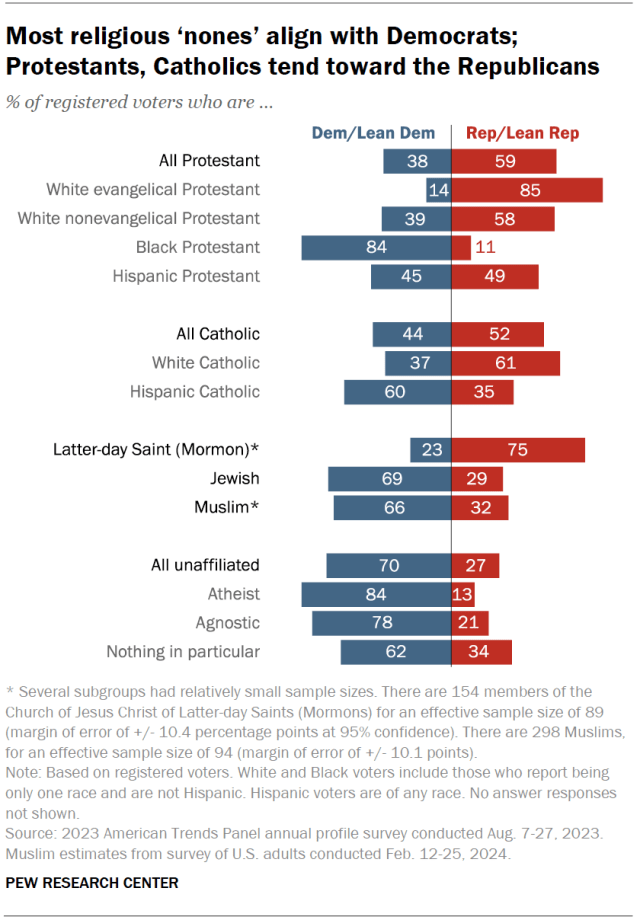Our most recent book is titled Divided We Stand: The 2020 Elections and American Politics. Among other things, it discusses the state of the parties. The state of the GOP is not good.
Some Republican leaders -- and a measurable number of rank-and-file voters -- are open to violent rebellion, coups, and secession.
Trump and his minions falsely claimed that he won the election, and have kept repeating the Big Lie. And we now know how close he came to subverting the Constitution.
He is planning an authoritarian agenda and would take care to eliminate any internal dissent.
Public Religion Research Institute:
Most Americans disagree that those convicted of crimes from Jan. 6th are being held hostage by the government or that Trump should do whatever it takes to be President if he is not declared the winner in 2024; authoritarians and Christian nationalists are more likely to agree.
- Just 23% of Americans agree that “the people convicted for their role in the violent Jan. 6 attacks on the U.S. Capitol are really patriots who are being held hostage by the government.”
- A plurality of Republicans (43%), including half of those who hold favorable views of Trump (51%), agree with this idea, compared with 16% of Republicans with unfavorable views of Trump, 20% of independents, and 7% of Democrats.
- Christian nationalists and authoritarians are more likely to hold this belief than others, though Christian nationalists (44%) agree at higher rates than Americans who score high on the RWAS (38%) and CRAS (28%).
- Just 14% of Americans agree that “if Donald Trump is not confirmed as the winner of the 2024 election, he should declare the results invalid and do whatever it takes to assume his rightful place as president,” compared with 24% of Americans who score high on the RWAS and 28% of Christian nationalism supporters.
Republicans, authoritarians, and Christian nationalists are far more likely than other Americans to believe that the Democrats have “weaponized the Department of Justice to try and silence Donald Trump and his supporters.”
- While roughly four in ten Americans believe the Justice Department has been weaponized against Trump and his supporters (39%), a strong majority of Republicans (78%), particularly those who hold favorable views of Trump (88%), agree, compared with 37% of independents, and 8% of Democrats.
- The majority of white evangelical Protestants (69%) and white Catholics (54%) agree, compared with minorities of members of other religious groups.
- Christian nationalism supporters (67%) are more likely than those who score very high or high on the RWAS (61%) and CRAS (50%) to agree with the weaponization of the Department of Justice against Donald Trump and his supporters.
Right-wing authoritarians and Christian nationalists are most supportive of the need for a strong leader who is willing to break the rules.
- Just one in three Americans agree with the idea of a leader who is willing to break some rules if that’s what it takes to set things right (34%).
- More than half of Republicans who view Trump favorably (55%) agree that we need a leader willing to break some rules compared with 26% of Republicans with unfavorable views of Trump, 32% of independents, and 22% of Democrats.
- The majority of those who score high on the RWAS (59%) and those who qualify as Christian nationalism Adherents and Sympathizers (55%) agree with the need for a leader who is “willing to break some rules,” compared with 44% of those who score high on the CRAS.
Americans remain broadly supportive of the separation of powers and believe presidents should not have immunity from criminal prosecution or be allowed to limit opposing parties.
- Just two in ten Americans agree that former presidents should be immune from criminal prosecution (23%); have the power to limit opposing parties (20%); or ignore Congress or the Supreme Court (19%).
- Among Republicans with favorable views of Trump, 50% agree that former presidents should be immune from criminal prosecution, compared with 19% of Republicans who do not hold favorable views, 20% of independents, and 10% of Democrats.
- Among Americans who score high on both authoritarian scales and who qualify as Christian nationalism supporters, around one-third or fewer agree with these three measures that would strengthen the power of the president, except for 42% of Christian nationalism supporters who agree with immunity for former presidents.
While most Americans reject political violence, those who score high on the RWAS, CRAS, and Christian nationalism scales, as well as Republicans with favorable views of Trump, are more likely to do so.
- Just 16% of Americans agree that “patriots may have to resort to violence in order to save our country,” 16% agree that “if the 2024 presidential election is compromised by voter fraud, everyday Americans will need to ensure the rightful leader takes office, even if it requires taking violent actions,” and 15% agree that armed citizens are needed as poll watchers to ensure a fair presidential election.
- Republicans are more likely than independents and Democrats to agree that patriots may have to resort to violence (27%, 15%, and 8%, respectively); Americans need to ensure the rightful leader takes office, even with violence (24%, 15%, and 10%, respectively); and that armed citizens are needed as poll watchers (24%, 10%, and 10%, respectively). Republicans with favorable views of Trump are more likely to agree with all three statements (32%, 27%, and 28%, respectively).
- Christian nationalism supporters are slightly more likely than Americans who score high on the RWAS or CRAS to agree that true American patriots may have to resort to violence in order to save our country (33%, 28%, and 21%, respectively) or to ensure that the rightful leader takes office (30%, 26%, and 20%, respectively), and that armed citizens are needed as poll watchers (29%, 25%, and 20%, respectively).
Apocalyptic religious views, support for “Seven Mountains” theology, and the idea that America was chosen to be a promised land for European Christians are strongly linked to support for authoritarianism and Christian nationalism, religion, partisanship, and news trust.
- Two-thirds of Republicans (65%) agree that “the final battle between good and evil is upon us, and Christians should stand firm with the full armor of God,” compared with 39% of independents, and 32% of Democrats. More than eight in ten Christian nationalists (84%) hold this apocalyptic position, as do 70% of Americans with high RWAS scores and 61% of those with high CRAS scores.
- More than three in four Americans who most trust conservative news sources (76%) and nearly seven in ten Americans who most trust Fox News (69%) agree with this apocalyptic statement, compared with 44% who do not watch TV news and 37% who most trust mainstream news.
- Just one in four Americans (25%) believe that “God wants Christians to take control of the ‘7 mountains’ of society,” including 39% of Republicans, 18% of independents, and 17% of Democrats, while fewer than two in ten Americans (17%) believe that America was chosen by God to be a new promised land for European Christians (30% of Republicans, 15% of independents, and 8% of Democrats).
- No religious group has majority agreement with these two statements, but white evangelical Protestants are the most likely to agree (48% and 33%, respectively).
Support for authoritarianism and Christian nationalism are associated with the belief that America is in danger of losing its culture and identity.
- Most Republicans (80%), particularly those who favor Trump (86%), along with 54% of independents and 38% of Democrats agree that America is in danger of losing its culture and identity.
- Most Christian nationalism supporters (82%) as well as those who score high on the RWAS (82%) agree that America is losing its culture and identity; most Americans scoring high on the CRAS do so as well (69%).
- Except for religiously unaffiliated Americans (41%) and other non-Christians (39%), majorities of other religious groups agree that America is losing its culture and identity, especially white evangelical Protestants (77%) and white Catholics (68%).
Most Americans reject patriarchal views that defend traditional gender roles; however, Republicans and Christian nationalists are more likely than others to support these views.
- Less than half of Americans believe that society has become too soft and feminine (41%), the husband is the head of the household (32%), society is better off when men and women stick to the jobs and tasks they are naturally suited for (32%), the truest vocation for any woman is to be a wife and mother (25%), and that women’s gains have come at the expense of men (17%).
- Across all five measures, Republicans, particularly those who favor Trump, are more likely than independents and Democrats to agree, and Christian nationalism supporters are more likely than those with high RWAS and CRAS scores to agree.
Views about immigrants’ impact on the economy and local communities as well as extreme views on immigration are strongly related to authoritarianism and Christian nationalism, as is partisanship.
- Nearly two-thirds of Americans agree that immigrants are generally good for America’s economy (65%), but 56% also agree that the growing number of newcomers burdens local communities. Significantly fewer Americans agree that immigrants increase crime rates in local communities (38%).
- Republicans are significantly more likely than independents and Democrats to agree that immigrants are a burden to local communities (84%, 54%, and 35%) and increase crime rates (67%, 35%, and 17%), with a larger gap between the views of Republicans who view Trump favorably and unfavorably on immigrants as increasing crime rates (75% vs. 37%, respectively) compared with immigrants burdening local communities (88% vs. 74%).
- Most Christian nationalism supporters and Americans who score high on the RWAS agree that immigrants burden local communities (79% and 77%, respectively) or increase crime (63% and 59%, respectively).
- Roughly one-third of Americans agree with the statements that immigrants who enter the country illegally are poisoning the blood of our country (35%), we should round up all immigrants who are in the country illegally (35%), and immigrants are invading our country and replacing our cultural and ethnic background (33%).
- About six in ten Republicans agree with all three statements (64%, 63%, and 60%), compared with three in ten independents (30%, 31%, and 30%), and under two in ten Democrats (16%, 17%, and 14%). Republicans who hold favorable views of Trump are more than twice as likely as those with unfavorable views to agree with all three statements.
- Except for white evangelical Protestants (54%, 56%, 55%), no religious group reaches majority agreement for any of these three statements.
- Over six in ten Christian nationalism Adherents and Sympathizers (64%), 59% of those who score high on the RWAS, and 48% of those who score high on the CRAS agree that immigrants are poisoning the blood of our country.



